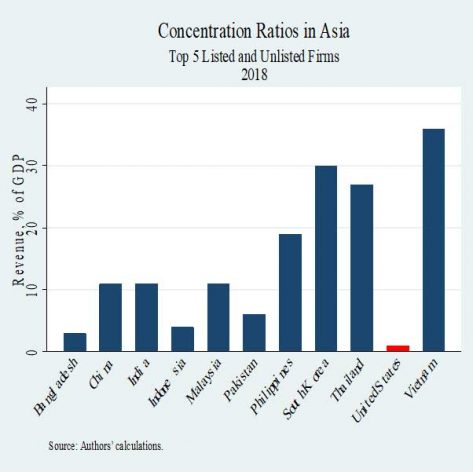Asia: the Power of Connections and their Consequences

LONDON, Nov 24 (IPS) - In our recent book, “The Connections World: The Future of Asia”, published by Cambridge University Press in October 2022, we argue that mutually beneficial links between dynastic business houses and political elites have been important drivers behind Asia’s extraordinary renaissance. Yet, these close ties now threaten future economic growth.
That is because the ubiquitous Asian corporate structures of Business Groups systematically work with politicians in Asia to create excessive market power and overall concentration. They have proven remarkably adept at entrenching themselves.
Although, by concentrating resources in relatively few hands, this was quite an effective engine of growth in the past half century, the limitation of competition and brake on innovation threatens future progress.
The pervasive and highly resilient networks of connections running between businesses and politicians have provided a common backbone to Asian development and have cut across political systems. We characterize these networks as the Connections World.
That world comprises a web of interactions between businesses and politicians/political parties that are highly transactional and commonly contain significant degrees of reciprocity.
Thus, politicians look to firms to make campaign or personal contributions; pay bribes; provide jobs for family or associates whilst also providing reciprocal favours, such as creating jobs in regions or at moments that are politically advantageous.
At the same time, businesses look to politicians for protection from foreign or domestic competition; to supply subsidies, loans and/or public sector contracts. All parties benefit from these interactions, creating a stable political economy equilibrium.
These arrangements have served Asia well over the past half century, with Asia’s share of the world economy rising from 9% in the 1970s to nearly 40% now. However, the connections world will provide a less supportive foundation for growth in the future for a variety of reasons. Neither politicians nor business groups have sufficient interest in stimulating competition, whether through the entry of domestic or foreign multinational as competitors.
Moreover, because Asian business groups are often highly diversified, with the control of the oligarch or dynasty enhanced by cross-holdings and ownership pyramids, their economic consequences must be measured not only by the traditional measures of market power, but also by overall levels of concentration as, for example, indicated by the share of total revenues for the largest five firms relative to GDP.
To put this in context, while the market concentration ratio (CR5) of the largest US firms, mainly in tech sectors, is often high, the five-firm overall concentration ratio is only around 3%. The comparable figures across Asia in 2018 are much higher, as can be seen in Figure 1. The CR5 in South Korea exceeds 30% and even in very large economies - India and China - it exceeds 10%.
The findings are even starker when we consider the largest ten firms (CR10). In the US, this is only around 4% but in South Korea exceeds 40% and in India and China exceeds 15%.
Looking forward, the consequences of the connections world will be far less propitious, not least because growth will have to rely increasingly on innovation. The existing networks are, for the most part, ill-suited to promote innovation which thrives on an open ecosystem of science universities and business parks, capital funders, lawyers and entrepreneurs and a healthy willingness to risk and lose.
Moreover, the connections world crowds out new entrants, soaks up capital and skilled workers and managers and suppresses the competitive environment so essential for the trial-and-error process at the heart of much successful innovation. Even when the business groups themselves are innovative, there is relatively little innovation going on in the wider economy.
What should be the policies and other measures that could address the shortcomings of the connections world? Central to the policy menu for loosening the grip of entrenched business will have to be measures designed to induce the transformation of business groups into more transparent and better governed businesses, while also radically weakening the links between politicians and business.
This will not happen naturally because the mutual benefits from market entrenchment and political connections outweigh any gains to the current players from reform. The required policies will need to include changes to corporate governance that undercut pyramidal ownership structures, mergers and cross-holdings, that impose inheritance taxes and shift to new types of – and targets for - competition policy.
Some of those policies were successfully introduced in the USA under Roosevelt. More recently, Israel has adopted criteria in competition policy for overall, as well as specific market, concentration levels, while South Korea has placed high inheritance taxes at the heart of their raft of policies to weaken the vice-like grip of their gigantic business groups.
At the same time, measures need to be adopted aimed at limiting the discretionary scope and incentives for politicians to leverage their connections for personal or family benefit. Although hard to achieve, incremental improvements, such as through audited registers of interests, can start to affect behaviour.
In short, although many commentators have already declared the 21st century to be Asia’s, that is far from predetermined. Unless the sorts of policies that we propose are introduced to roll back the tentacles of the connections world, many Asian economies will in fact find themselves unfavourably placed to exploit their potential in the coming decades.
Simon Commander is Managing Partner of Altura Partners. He is also Visiting Professor of Economics at IE Business School in Madrid. Saul ESTRIN is Professor of Managerial Economics at LSE and previously Professor of Economics and Associate Dean at London Business School.
IPS UN Bureau
Follow @IPSNewsUNBureau
Follow IPS News UN Bureau on Instagram
© Inter Press Service (2022) — All Rights Reserved. Original source: Inter Press Service

